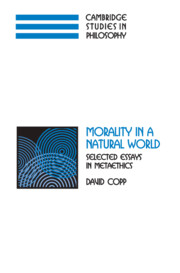Book contents
- Frontmatter
- Contents
- Preface
- Acknowledgments
- Introduction
- Part One Naturalism: Epistemology and Metaphysics
- Part Two Referring to Moral Properties
- 5 Realist-Expressivism: A Neglected Option for Moral Realism
- 6 Milk, Honey, and the Good Life on Moral Twin Earth
- 7 Referring to Moral Properties: Moral Twin Earth, Again
- Part Three Naturalism and Normativity
- Index
- References
7 - Referring to Moral Properties: Moral Twin Earth, Again
Published online by Cambridge University Press: 19 July 2009
- Frontmatter
- Contents
- Preface
- Acknowledgments
- Introduction
- Part One Naturalism: Epistemology and Metaphysics
- Part Two Referring to Moral Properties
- 5 Realist-Expressivism: A Neglected Option for Moral Realism
- 6 Milk, Honey, and the Good Life on Moral Twin Earth
- 7 Referring to Moral Properties: Moral Twin Earth, Again
- Part Three Naturalism and Normativity
- Index
- References
Summary
Let “moral naturalism” be the view that (1) the central semantic function of moral terms such as “right” and “wrong” is to ascribe moral properties, properties such as rightness and wrongness, and that (2) each of these properties is a ‘natural’ property. Let “synthetic moral naturalism” be the view, in addition, that (3) each moral property could, at least in principle, be ascribed by a predicate couched in nonmoral naturalistic vocabulary, where (4) the corresponding identity claim is synthetic. That is, where “M” is a moral predicate that ascribes a moral property Mness, and “N” is a distinct (perhaps very complex) predicate couched in nonmoral vocabulary that ascribes a natural property Nness, if a version of synthetic naturalism implies that Mness is identical to Nness, then it also implies that this is not a conceptual truth.
A fully developed version of synthetic moral naturalism would include a semantics for moral predicates. It would explain what it is that determines which specific natural property is ascribed by a given moral predicate. To avoid being objectionably ad hoc, moreover, synthetic moral naturalism must take on board a general semantic theory of the relation between predicates and properties and apply this theory to the case of moral predicates. Taken together with relevant nonsemantic facts, the resulting moral semantics should determine (nontrivially) which natural property it is that a given moral predicate is used to ascribe in standard literal assertoric uses.
Terence Horgan and Mark Timmons have argued, however, that this strategy cannot work.
- Type
- Chapter
- Information
- Morality in a Natural WorldSelected Essays in Metaethics, pp. 230 - 246Publisher: Cambridge University PressPrint publication year: 2007



